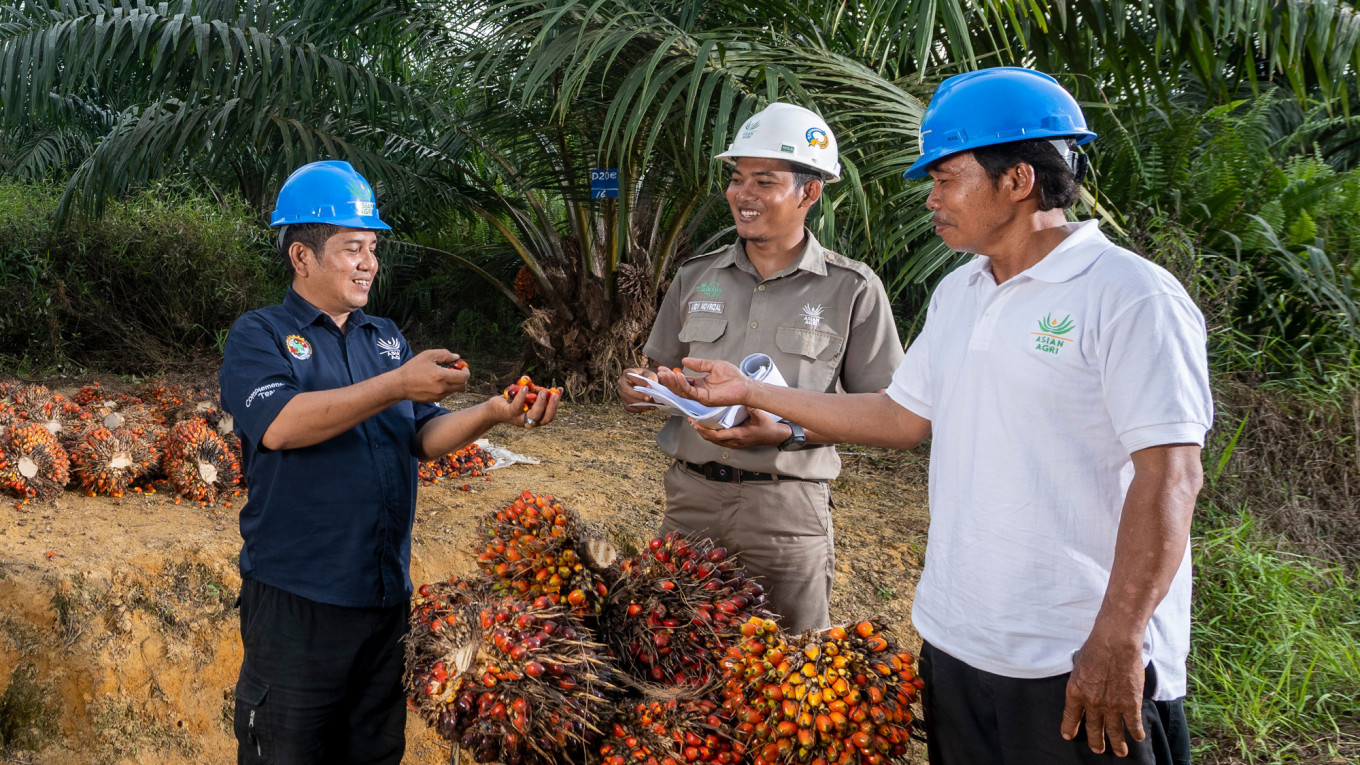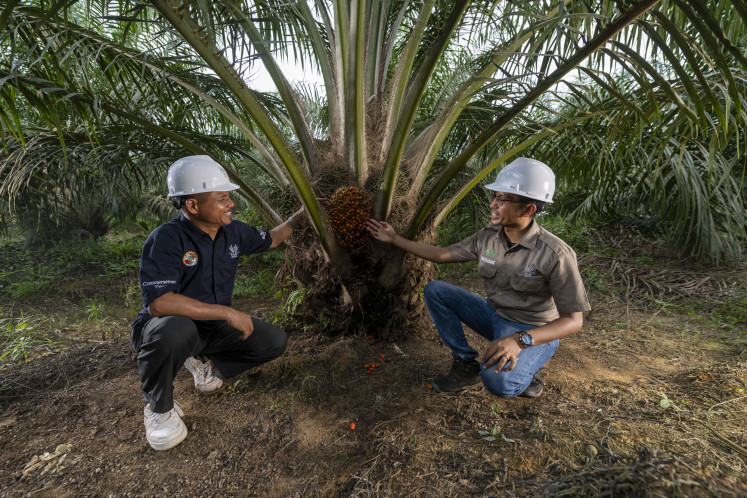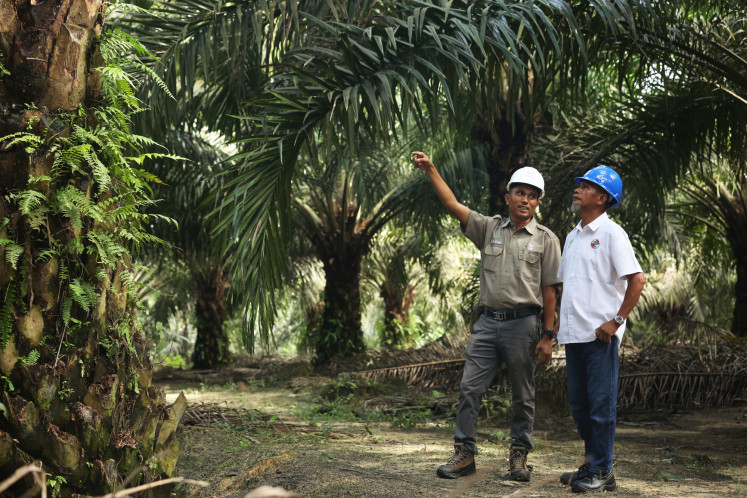Popular Reads
Top Results
Can't find what you're looking for?
View all search resultsPopular Reads
Top Results
Can't find what you're looking for?
View all search resultsAsian Agri outlines progress toward 2030 sustainability targets
Change text size
Gift Premium Articles
to Anyone
A
sian Agri, one of Indonesia’s largest palm oil producers, has recorded relatively positive developments at the midway point of its AsianAgri2030 sustainability commitment.
As part of the Royal Golden Eagle (RGE) Group, Asian Agri launched Asian Agri 2030 in 2022, aligned with the values of the United Nations’ Sustainable Development Goals (SDG), as well as RGE’s 5C philosophy of good for the community, country, climate, customer and company.
RGE palm business director of corporate affairs Johan Kurniawan said palm oil is a key element of the national economy, from foreign exchange contributions to job providers. Thus, the palm oil industry is integral to improving the welfare of smallholders, especially those included in partnership and scheme smallholder programs.
"As producers and processors of palm oil, Asian Agri operates by prioritizing responsible sustainable principles so that the products produced bring benefits. Starting from domestic household needs such as cooking oil and up to powering aircraft, in short #DariDapurSampaiAvtur," he added.
As part of its efforts to create a sustainable palm oil industry, the Asian Agri 2030 commitment and long-term strategy focuses on four main pillars; Smallholder Partnership, Inclusive Growth, Climate Positive and Responsible and Sustainable Production.
After two years of operation, the company has recorded some positive developments, with several targets being met.
Championing smallholders
The Smallholder Partnership pillar aims to improve the livelihoods of smallholders or farmers through intensive engagement, with goals including doubling smallholder income through replanting programs, 100 percent completion of smallholders’ replanting programs, 100 percent Indonesia Sustainable Palm Oil (ISPO) certification for smallholders and supporting 5,000 independent smallholders to be Roundtable on Sustainable Palm Oil (RSPO) certified.
Since the start of its replanting program in 2016, Asian Agri has replanted 32 percent of the approximately 60,000 ha of scheme smallholder plantations.
With an aim of reaching an average yield of 30 tonnes of fresh fruit bunches (FFB) per hectare by 2030, the smallholders have averaged between 1.12 to 1.78 times the baseline of 15 tonnes of FFB/ha, with the highest recorded at 20.3 tonnes of FFB/ha.
Asian Agri sustainability manager Leonardo Yapardi said smalholders play an important role in the sustainability of Asian Agri, and the company is committed to certifying all scheme smalholders with ISPO certification by 2025.
"Through the spirit of #BermitraLebihBaik, Asian Agri encourages KUD [village cooperative units] to start the certification process in accordance with government policies on ISPO obligations in 2025," he explained.
As of 2024, Asian Agri had helped 37 KUD obtain ISPO certification, equivalent to 49 percent of the target. In addition, the company has also assisted around 1,300 independent smallholders in receiving RSPO certification through the Smallholder Inclusion for a Better Livelihood & Empowerment (SMILE) program, which was launched in 2020 in collaboration with Apical and Japan’s Kao Group. This represents 27 percent of the 5,000 smallholder target by 2030.
Empowering communities
Inclusive Growth encourages strong participation from communities to achieve the best quality of life, with a target of eliminating extreme poverty in the areas around Asian Agri’s operational areas; establishing micro, small and medium sized enterprises (MSMEs) in villages around operational areas and the provision of school essentials for students.
To that end, Asian Agri assisted local communities in starting SMEs through entrepreneurship workshops, identifying local commodities and offering business strategy advice. In 2024, the company supported the establishment of MSMEs in 54 out of 159 villages around its operational areas in North Sumatra, Riau and Jambi, an area spanning 500,000 ha.
Through the Bag-to-School program, Asian Agri has distributed more than 1,300 education packages to elementary, junior high and high school students, with a distribution target of 5,000 packages by 2030.
Preserving nature
The Climate Positive pillar promotes sustainable palm oil production through best management practices, such as committing to a one-to-one ratio for restoration areas, achieving net-zero emissions from land use, optimizing methane capture facilities for all mills and using 100 percent renewable energy for all operations.
In 2024, Asian Agri recorded 3.3 tCO2eq/tonne CPO in greenhouse gas (GHG) emissions for Scope 1 and 2. To reduce GHG emissions from palm oil mills, it has built 11 biogas plants as methane capture facilities, which can potentially reduce GHG emissions from mill operations by 90 percent.
In turn, the biogas powers gas engines to provide green electricity for the company’s mills, kernel crushing plants and housing complexes, thus reducing their dependency on fossil fuels.
Sustainability through and through
The last pillar, Responsible and Sustainable Production, shapes Asian Agri’s integrated course of action to establish sustainable products. It aims to achieve no new land clearings for plantations, promote environmentally friendly practices for sustainable operations, implement a circular economy through best operational practices and reduce pesticide usage by 50 percent.
Asian Agri has not opened new land since 2003, instead intensifying its approximately 100,000 ha of plantations by planting superior seeds from its R&D department and applying best management practices.
The company also consistently maintains 100 percent of its plantation certifications, including ISPO, RSPO, International Sustainability and Carbon Certification (ISCC), Kosher, Good Manufacturing Practices + (GMP+), Hazard Analysis and Critical Control Points (HACCP) and Green Gold Label (GGL).
In reducing pesticide usage, Asian Agri employs mechanical traps and natural predators to control pest growth.
Leo added that Asian Agri will continue to carry out a series of programs and initiatives in collaboration with related parties to ensure the achievement of targets in 2030.
Source : Asian Agri












